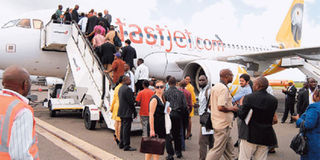The rise and fall of Fastjet Tanzania

What you need to know:
The future of the once-popular low-cost airline looks increasingly uncertain after TCAA gave it 28 days to address regulatory and non-regulatory issues that disqualify it from operating in the country
Dar es Salaam. It looks like the end is nigh for low-budget airline Fastjet Tanzania.
The 28-day notice by the Tanzania Civil Aviation Authority (TCAA) directing the airline to settle regulatory and non-regulatory issues by January 14, 2019 – coupled with a recent own statement on suspension of both international and domestic routes – seem to be the death knell for the carrier in Tanzanian skies.
Established six years ago, Fastjest-Tanzania was once upon a time popular with air travellers for its assured travel schedules. But it slowly degenerated into a fourth-rate service provider due to flight delays and abrupt cancellations.
Yesterday, the TCAA announced a suspension of the Embraer 5H plane owned by Fastjet Airline Ltd (Tanzania) due to outstanding debts owed to various suppliers and aircraft maintenance.
TCAA director general Hamza Johari told reporters yesterday that the airline currently has an insufficient number of airworthy planes for scheduled flights, and has no professional accountability manager.
The airline had two leased planes, one of which was undergoing maintenance abroad, while the other was grounded by TCAA. Both are registered in Tanzania.
“Fastjet requested return of the plane to the leasing company, but we hold it on account of the huge debt owed by the airline,” Mr Johari said, stressing that one of the criteria for an airline to operate in the country is to have reliable planes – which Fastjet doesn’t have.
In the event, TCAA has directed the airline to pay all its debts, and submit its business and financial plans to it. This happened a few days after the firm’s majority shares were acquired by a former Cabinet minister, Mr Lawrence Masha.
In a statement released yesterday, Fastjet announced cancellation of all domestic flights that were planned for this December and January 2019. This comes on the back of financial woes the airline has been facing lately.
Fastjet said cancellation of its flights was based on operational issues, details of which it did not mention.
Related to:
Debut in 2012
Fastjet Tanzania launched its low-cost services at a colourful ceremony in Dar es Salaam on 29 November 2012.
Before the launch, substantial preparations were made in the areas of staff recruitment, IT, sales and marketing, etc., to ensure that the airline met its stated commitment of providing services of international standards.
Good old times
The airline’s first two years of operations were positive, with thousands of passengers turning to it that caught the attention of the regulator, the Tanzania Civil Aviation Authority (TCAA).
In July 2013, when publishing its performance record for its first year of operations, the then Fastjet chief executive, Mr Ed Winter, painted a picture of strong performance on a month-to-month basis.
Passenger revenue for July 2013 was over $2.5 million, which represented a revenue increase of over 10 per cent against the previous month, and a $700,000 increase since May 2013, Ed Winter said.
The figures were attributed to a jump in passenger volumes on the existing routes, successful reintroduction of the Kilimanjaro-Zanzibar route and a 17 per cent increase in ancillary revenues.
On July 31st in the same year, Fastjet launched ticket sales for the long-awaited international route between Dar es Salaam and Johannesburg.
Initially, flights on the route operated three times a week, and the first flight was scheduled for 27th September 2013.
However, as demand for seats on Fastjet’s signature Airbus A319s rose remarkably, the company increased the frequency of flights. It was the first of international routes that Fastjet has applied for.
The airline’s chairman and chief executive officer were once quoted as saying that “these are excellent figures. They show the strength of our brand, and the support we are receiving from the Tanzanian population.
Bad moment
Business troubles began to haunt Fastjet in March 20, 2016 when its management circulated reports that Mr Ed Winter had to step down two weeks after its second-largest shareholder, Stelios Haji-Ioannou, called for his dismissal.
In February 2016, the EasyJet founder – who owned a 12 per cent stake in the company through a private investment vehicle – called for dismissal of Ed Winter “immediately.”
However, Ed Winter stepped down on March 18 of the same year.
In the Middle of 2017, the Fastjet management was busy rebranding its services for tackling the projected challenges as it was operating in the main market of Tanzania and the rest of Southern African countries.
In September 2018, Fastjet considered dropping its Tanzanian operations – and disclosed in its half-yearly financial statements filed with the London Stock Exchange (LSE) that it was considering closing down its operations in Tanzania, on account of the “continued losses generated in the country.” The statement showed a $14.6 million net loss on $30.1 million in revenues for the six-month period to June 30, 2018.
Red flag
Despite all those good early stories, however, Fastjet Tanzania is now neck-deep in assorted woes.
In the few days since former Home Affairs minister Lawrence Masha announced his acquisition of 68 per cent of the airline’s shares, hope seemed to be restored in the airline, with some thinking that it might recover. A few days later, however, passengers booked on Fastjet at the Mwanza airport complained about flight cancellation without advance notice.
At long last, Fastjet Tanzania yesterday announced suspension of its domestic flight schedules that were planned for this December and January next year. If nothing else, this is ample testimony to the bad end which the airline faces.
Reported by Ludger Kasumuni, Gadiosa Lamtey and Khalifa Said


